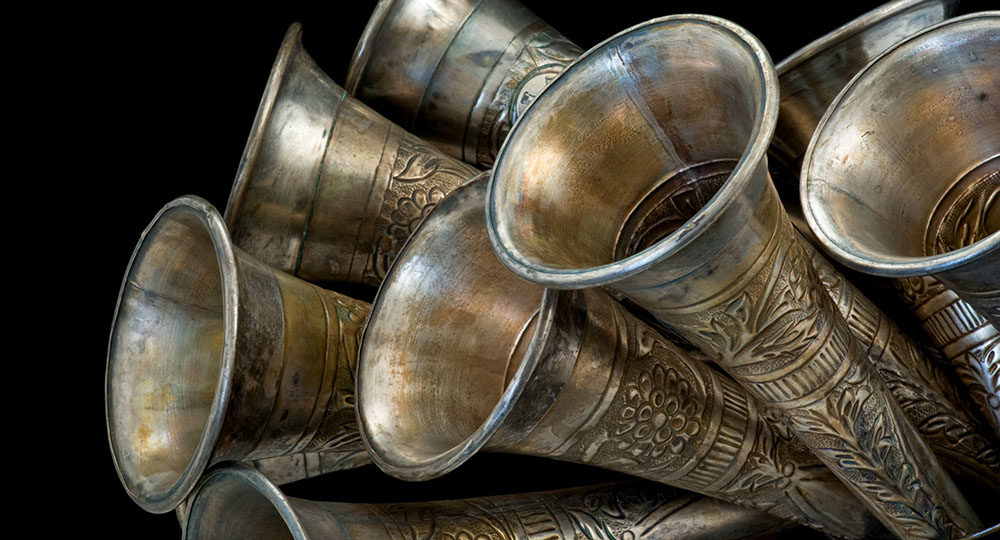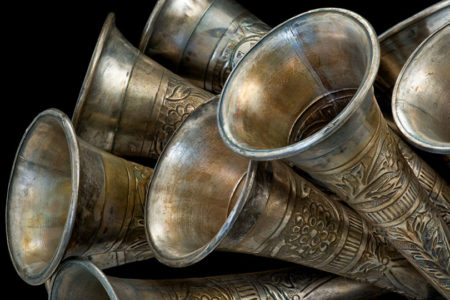Hallelujah Revelation 19:1–6
Revelation 19–21 moves history into its glorious Hallelujah phase. In the first six verses of chapter 19, four resounding Hallelujahs (praise the Lord) are raised—the only place in the New Testament where this word is used. It would seem that the Lord reserved this fourfold proclamation of praise for the climactic stage of His program for humanity.
Hallelujah for Salvation
“And after these things I heard a great voice of many people in heaven, saying, Hallelujah! Salvation, and glory, and honor, and power, unto the Lord, our God” (Rev. 19:1).
Revelation 19:1–6 resounds with an explosion or praise. The final stage of redemption’s delivery system has been fully activated, and the saints respond accordingly.
Running through the whole of the passage, on the positive side of the ledger is the triumphant refrain of the unbridled exultation of the saints for the fullness of the salvation He has wrought. Further, the implication includes praising Him as an ever-present deliverer of the believer. Second Corinthians 1:10 delineates the three phases of the believer’s deliverance: “Who [Christ] delivered us from so great a death, and doth deliver; in whom we trust that he will deliver us.” First, we are now delivered from the penalty of sin. Next, we are being delivered from the power of sin. Finally, we will be delivered from the presence of sin. In Revelation 19, the Word begins to unfold the final stage—our deliverance from the presence of sin. In Heaven with Christ, we sing of Him who made it all possible, for He has …
Redeemed us—“for thou wast slain, and hast redeemed us to God by thy blood out of every kindred, and tongue, and people, and nation” (Rev. 5:9).
Received us—“I heard a great voice of many people in heaven” (Rev. 19:1).
Readied us to reign with Him—“And hast made us unto our God a kingdom of priests, and we shall reign on the earth” (Rev. 5:10).
On earth, events are moving rapidly toward the final chapter; payday is here at last.
Hallelujah for Divine Justice
“For true and righteous are his judgments; for he hath judged the great harlot … And again they said, Hallelujah! And her smoke rose up forever and ever” (Rev. 19:2–3).
In the aftermath of the Gulf War, millions of frustrated people the world over asked why justice was not executed on Saddam Hussein. Why was he allowed to survive as a national leader after inflicting such demonic carnage throughout the Middle East? Theirs is a cry heard repeatedly across the centuries as tyrants have appeared to go unpunished.
The classic biblical cry for such justice is heard in Revelation 6:10. Tribulation saints who had been martyred by the Antichrist and his cohorts exclaim, “How long, O Lord, holy and true, dost thou not judge and avenge our blood on them that dwell on the earth?” (Rev. 6:10). Their Hallelujah of Revelation 19:3 proclaims that justice has been done. Chapters 17 and 18 record the events.
Chapter 17 reveals the judgment of “the great harlot that sitteth upon many waters” (17:1). Scholars of prophecy conclude that the judgment described here is associated with the final calamity brought on the apostate Church represented by corrupt spiritual Babylon. Following the Rapture of the true Church, religion will, of course, survive. But her skirts will be red with the blood of Tribulation saints (17:6).
Intriguingly, God will employ the godless forces of the Antichrist and his political Babylon allies to destroy the harlot who was “drunk with the blood of the saints” (17:6), for “these shall hate the harlot, and shall make her desolate and naked, and shall eat her flesh, and burn her with fire. For God hath put in their hearts to fulfill his will” (17:16–17).
In chapter 18, political Babylon, whose “sins have reached unto heaven,” will be judged by the “God [who] hath remembered her iniquities” (18:5). This is the summary outpouring of divine wrath upon the aggregate sins of a godless world system that has afflicted Jewry and faithful Gentile believers for millennia. Thus, the hosts of Heaven rejoice at her destruction and revel in the anticipation of the final disposition of the Antichrist, his prophet, and Satan who authors the anti-God conspiracy. “Rejoice over her, thou heaven, and ye holy apostles and prophets, for God hath avenged you on her” (18:20).
Hallelujah of Worship
“And the four and twenty elders and the four living creatures fell down and worshiped God that sat on the throne, saying, Amen. Hallelujah!” (Rev. 19:4).
The 24 elders are clearly the representatives of the Church in Heaven, for they are those who sang the new song of Revelation 5 in praise of Him who “wast slain, and hast redeemed us to God by thy blood out of every kindred, and tongue, and people, and nation” (Rev. 5:9).
They are charged to “Praise our God” (Rev. 19:5). Thus, the voices of those “servants,” who will have the indescribably privilege of serving Him throughout eternity (Rev. 22:3), fill the universe with thunderclaps of praise and adoration.
The Lamb and His exploits will be a central theme of the worship songs of the saints.
“Thou art worthy, O Lord, to receive glory and honor and power; for thou hast created all things, and for thy pleasure they are and were created” (Rev. 4:11).
“And the number of them was ten thousand times ten thousand, and thousands of thousands, Saying with a loud voice, Worthy is the Lamb that was slain to receive power, and riches, and wisdom, and strength, and honor, and glory, and blessing” (Rev. 5:11–12).
The song “Worthy is the Lamb” has become a favorite of multitudes of believers in recent years. The theme is in perfect harmony with the triumphant worship song we will share with Him in Heaven as the final triumph unfolds.
Hallelujah for His Sovereignty
“And I heard, as it were, the voice of a great multitude, and like the voice of many waters, and like the voice of mighty peals of thunder, saying, Hallelujah! For the Lord God omnipotent reigneth” (Rev. 19:6).
A triunity of consummating events is described from verses 7 through 21 of Revelation 19.
The Marriage of the Lamb
“Let us be glad and rejoice, and give honor to him; for the marriage of the Lamb is come, and his wife hath made herself ready” (v. 7). She is “arrayed in fine linen, clean and white; for the fine linen is the righteousnesses of saints” (v. 8).
Isaiah 61:10 speaks of being clothed “with the garments of salvation … the robe of righteousness.” In Revelation 19, the bride’s raiment is “the righteousnesses of saints.” Better understood, it is literally the righteous deeds of the saints. These are the “good works” for which the believer is “created in Christ Jesus” (Eph. 2:10). In redemption we are clothed in the very righteousness of Christ and, consequently, made worthy for God’s presence through His finished work. As His bride, we are displayed in the array of our voluntary, faithful, loving service to the one who has loved us and drawn us to Himself.
All too few present-generation Christians pay much heed to the reward aspect of their relationship to Christ. Not many are deeply concerned about sending ahead that which will reap rewards to be lavished upon our Savior or displayed for His glory. May I suggest that when we arrive home to participate in the climactic events for which we are even now preparing, the rewards of lives well invested for him will mean a great deal.
The Coming of the Lord
Unlike His First Coming in humility as a babe in Bethlehem of Judea, or the first phase of His Second Coming to rapture the Church and bring the saints home to Heaven (Jn. 14:1–3; 1 Th. 4:14–18), Christ’s appearing will be the final act of the revelation of the Messiah. No one, Jew or Gentile, will doubt who He is or ponder why He has come. The stage that was set in Revelation 1:7 will be fully occupied: “Behold, he cometh with clouds, and every eye shall see him, and they also who pierced him; and all kindreds of the earth shall wail because of him. Even so, Amen.”
In a scene (19:11–16) that beggars the capacity to describe it, He descends. The “KING OF KINGS, AND LORD OF LORDS” (v. 16) rides a white horse, the manifestation of absolute victory. He is “clothed with a vesture dipped in blood” (v. 13), thus indicating that He comes on the basis of His sacrifice for sin and His victory over death. The evidence of Christ’s triumph over former foes is seen in the persons who follow Him “upon white horses, clothed in fine linen, white and clean” (v. 14). Revelation 17:14 describes this host as those who are called “chosen, and faithful.”
His coming will, on the one hand, answer the heart cry of the surviving Jewish remnant of the Great Tribulation for reconciliation with their long-spurned Messiah (Zech. 12:10–14). On the other hand, it will crush Gentile opposition to the King and His Kingdom. He who was once smitten (Isa. 53:4) will “smite the nations” (v. 15).
Three consequences of His coming are set forth.
- He will destroy the godless world system born at Babel (Gen. 11:1–4), perpetuated through subsequent history, and globalized in the last days.
- He will bring the nations to the “winepress of the fierceness and wrath of Almighty God” (v. 15).
- He will rule “with a rod of iron” (v. 15).
The “KING OF KINGS, AND LORD OF LORDS” will establish a theocratic Kingdom in which He will wield power as an absolute monarch. Satan and his despotic usurpers have attempted to create look-alike kingdoms throughout history. The perpetual problem has been the lack of a fit king or fit subjects for their kingdoms—sin has stood adamantly in the way.
Conversely, His glorious Kingdom will be marked by the very attributes that are His, for He is “called Faithful and True, and in righteousness he doth judge and make war” (v. 11). Faithfulness, truth, and righteousness will characterize His reign. In other words, everything for which saints of all ages have yearned and been denied will come at last!
Condemnation of the Ungodly
Ominous words greet us in verse 17. Fowls of Heaven are invited to “Come and gather yourselves together unto the supper of the great God.” Armageddon (Rev. 19:17–21) embodies chilling connotations for an unbelieving world. In a few words it says, “God is going to set things right.”
In what seems an incomprehensible display of anti-God belligerence, given all that the world has suffered during the Tribulation period, “the beast, and the kings of the earth, and their armies, gathered together to make war against him that sat on the horse, and against his army” (v. 19). The object of the last great battle between the forces of light and darkness is Jerusalem (Zech. 12:12; 14:1–3); a focal point is ancient Megiddo (Rev. 16:13–16) in the plain of Esdraelon.
To say that God’s adversaries are crushed is not too strong a statement. Daniel anticipated the scope and consequences of the confrontation when he told Nebuchadnezzar that “a stone … cut out without hands” would smite his image—representing world dominion without God—and smash it “to pieces … and the stone that smote the image became a great mountain, and filled the whole earth” (Dan. 2:34–35). Jesus Christ, “The stone which the builders rejected” (Lk. 20:17), the stone over which Israel stumbled (1 Cor. 1:23) becomes the smiting stone that will grind the adversaries into powder and, out of the dust, raise His great Kingdom mountain!
In preparation for His reign, the beast and false prophet are “cast alive into a lake of fire burning with brimstone. And the remnant were slain with the sword of him that sat upon the horse” (Rev 19:20-21). At the same time, “he laid hold on the dragon, that old serpent, who is the Devil and Satan, and bound him a thousand years, And cast him into the bottomless pit, and shut him up” (Rev. 20:2–3). Thus, the satanic trinity of Revelation 13 is disposed of to make way for the Kingdom era of peace and tranquility. The final preparation is the judgment of the living nations (Mt. 25:31–46), at which time all His enemies will be deposed, and only believers—Jew and Gentile—will enter the Kingdom.
Dominating the text in Revelation 19:11–21 is the Word of God.
Christ is referred to as “The Word of God” (v. 13).
“Out of his [Christ’s] mouth goeth a sharp sword [the Word of God]” (v. 15).
“The remnant were slain with the sword of him that sat upon the horse, which sword proceeded out of his mouth” (v. 21).
The same Word who spoke worlds into existence (Heb. 1:1–3), then Himself came to earth to manifest the very fullness of God (Jn. 1:14; Col. 1:15–19), now destroys all opposition to His sovereignty by but a word from His mouth. Our hearts should quicken at this revelation of His absolute power. It should also be translated into transcendingly practical terms as we realize that this very Word is ours to employ as we “Fight the good fight of faith” (1 Tim. 6:12) in these last days.









A very insightful article.